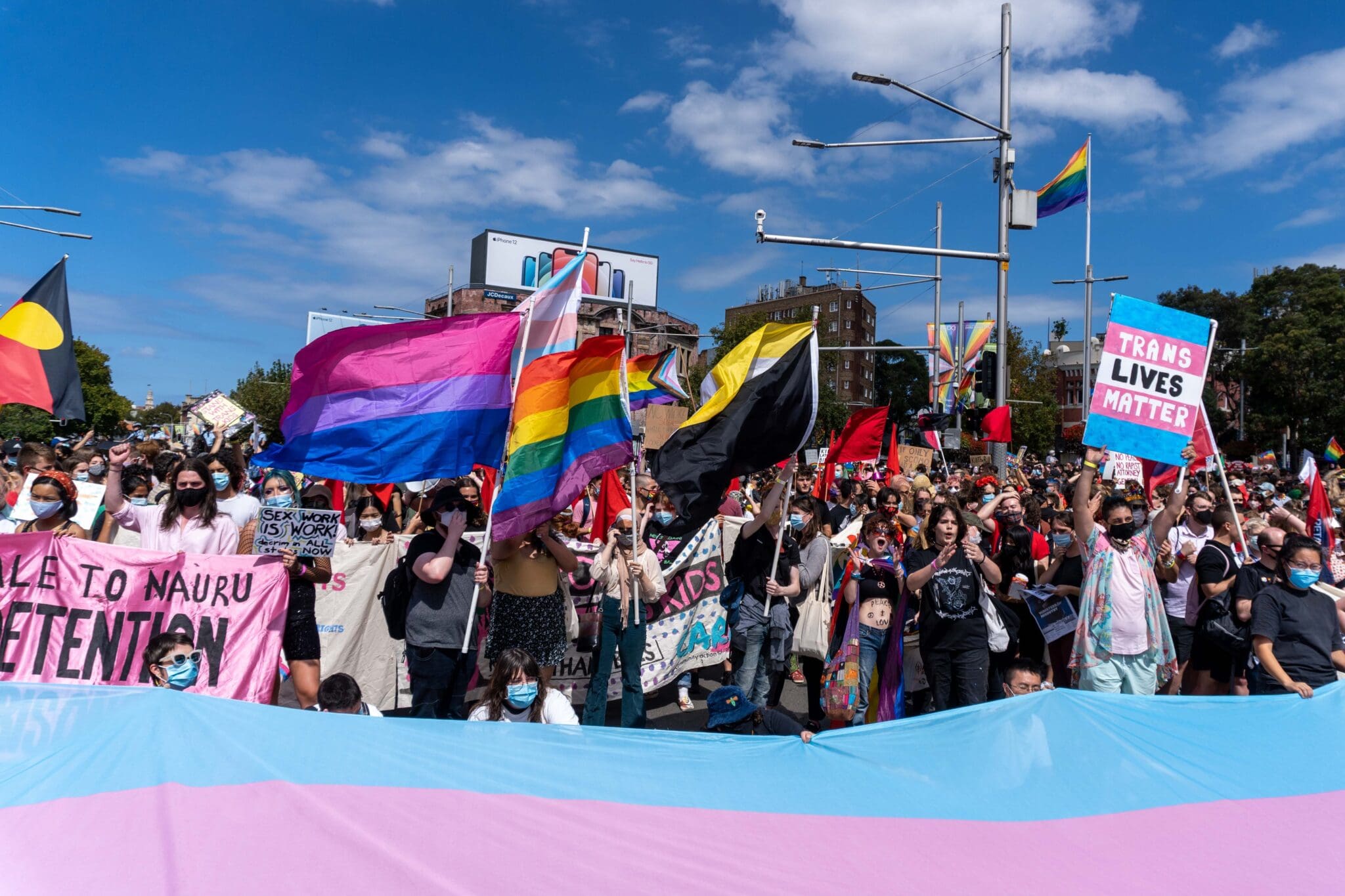Veiled in respectful silence, Taylor Square is surprisingly still, calm even. The sheer number of people that have turned up smother the occasional spot fires of nervousness that jump through the crowd. Bodies radiate quiet determination.
“I’m going to get a little bit emotional because, as I stand here on this occasion, I am recalling that first Mardi Gras”, says Mark Gillespie, microphone in hand, his voice filling Taylor Square.
Gillespie is a “78er”, one of the original protestors who marched down Oxford Street from Taylor Square on 24 June, 1978, to commemorate the Stonewall Riots. When police denied the marchers access to Hyde Park that night, where they planned to have speeches, cries of “on to the Cross” multiplied rapidly. Protestors broke through the police cordon and rushed on Kings Cross. Curious onlookers, stumbling from bars, watched on. Some joined the march. Some even joined the protestors in resisting arrest and fighting back against police when police turned on the crowd, brutally apprehending 53 people.
This resistance stimulated the widely-held belief that the protest was a riot. In 1979, protestors marched again, cementing as a legacy Sydney’s Mardi Gras Parade.
“It was protest and mass action that got us where we are today and it’s going to be protest and mass action that gets us the rest of the way”, yells April Holcombe from Community Action for Rainbow Rights at Taylor Square on Saturday 6 March, 2021. It’s a fierce assertion that the queer community has returned to its radical roots.
The horde have already surprised police by occupying the intersection between Oxford Street and Flinders Street. Soon, we begin to march.
An effervescent eruption of colour spills forth. A contagious bout of boogying ripples outwards like an earthquake, tugging at limbs. At the epicentre, electro swing emanates from a solar-powered wheelie-bin cum portable speaker. Chants gallop down Oxford Street ahead of the march like a first strike force.
“Bottoms and tops, we all hate cops!”
“We’re here, we’re queer: We’re fabulous, don’t fuck with us.”
When someone lets off a flare, pink smoke billows in the air like a satin bed sheet on a clothes line.
The march is part carnival, part protest, and at least 3000 strong – an incredible turn out considering the organisers scrambled last minute to advertise and legalise the rally. On Pride in Protest’s notice of intention to hold a public assembly, addressed to NSW Police, PiP put the number for the expected turn out at 900.
Three weeks later, as I sit in Camperdown Park with Charlie Murphy, I ask her why the Mardi Gras march was important. Her voices wobbles and her eyes glisten.
As a sex worker, she emphasises the importance of marching alongside Scarlett Alliance – Australia’s peak sex worker organisation. After the protest, someone from Scarlett Alliance messaged Charlie, thanking her for giving them the opportunity “to know what it would feel like for our communities to march in the 80s and 90s.”
Charlie cites their presence as evidence of the “revitalisation” of a community that had dropped out of the queer struggle. For her, sharing solidarity with other sex workers and trans communities was “invaluable”.
Oscar Chaffey, queer officer at the University of Sydney, meanwhile, underlines the importance of this historic event in the evolution of their own identity. “I went out in drag publicly for the first time at the Mardi Gras street protest and asked my friends to start referring to me with they/them pronouns. The queer community has always been fundamentally endearing to me for its colourful shades of regal defiance and beauty; it was ultimately the promise of belonging to these shades at our ‘gay Christmas’ that compelled me to leave behind an inauthentic version of myself.”
* * *
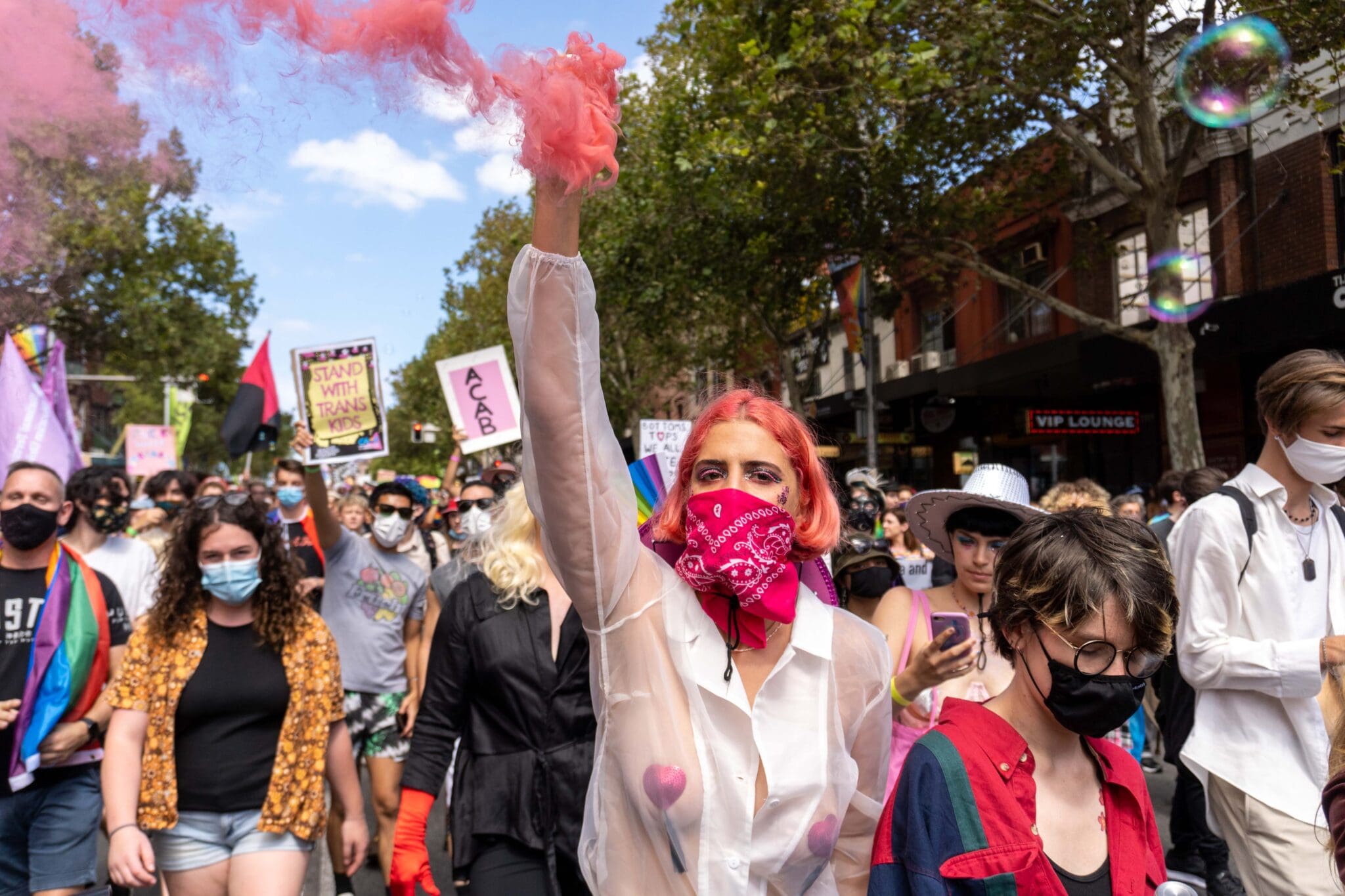
Charlie is an activist, a trans sex worker and a member of Pride in Protest (PiP), the splinter group behind the (unofficial) Mardi Gras protest on 6 March. She is also on the Sydney Gay and Lesbian Mardi Gras Board (SGLMG).
PiP was established in direct opposition to police presence at Sydney’s Mardi Gras Parade and corporate pinkwashing. In recent years, the group has platformed motions at Sydney Mardi Gras AGMs critical of entrenched and taken-for-granted principles. Charlie describes these meetings as “incredibly hostile”.
The tension behind Mardi Gras organising reached a climax this year. It resulted in the PiP led rally on Oxford Street on the same day, Saturday 6 March, as the official Mardi Gras Parade at the SCG. Relations between PiP’s (two) members on the SGLMG Board and the rest of the executive reached a head in early March when board members voted at a secret meeting to undemocratically, unceremoniously and temporarily boot out PiP’s two representatives on the Board – Charlie Murphy and Alex Bouchet.
The board granted neither Murphy nor Bouchet a right of reply, and there was no provision of evidence. Charlie believes the board “acted unconstitutionally”.
Murphy and Bouchet maintain that they have been squeezed out of the frame in a political pincer movement, seemingly for having the sheer audacity to support a march defending queer rights.
To say that Mardi Gras’s right-wing caucus view PiP as home-wreckers and gate-crashers, arriving late and uninvited to the house party with a posse of menacing, young hooligans, is no exaggeration. In the eyes of those right-wing members, PiP have rolled up with their own speakers to their doorstep, their residence, forced their way through the door, cut off the music and spray-painted their pristine white walls with scathing slogans, all to their own radical soundtrack. In their eyes, PiP have caused a stable queer community to turn on itself. The sacred, comfortable territory of the bedroom is now filled with screams and accusations.
Charlie does not agree. “They [the right-wing caucus] can’t accept the idea that we are community members who have a valid voice,” she says. “It’s not that we don’t like what Mardi Gras is and what Mardi Gras could be. It’s just that we don’t like what they do specifically… The thing that is hard for them to accept is that we like Mardi Gras too much. That’s why we are involved.”
PiP fight as much against liberalism in queer spaces as conservatism. Describing the ebb and flow of queer political history, Charlie suggests that the queer community “fell into a more liberal version of itself” during the marriage equality debate in 2017. While left-wing activists were involved in this public debate, the focus was on a liberal, human rights framework. Corporate power seized the opportunity to “exercise its influence over the queer community”, watering down radical messages. Since then, Charlie believes that united front politics have resurged in the queer community. People have returned to material questions and deepened ties with other materially-disadvantaged communities.
When I place the same topic before Mikhael Burnard, another PiP member, they have a similar response. “I would say the marriage equality campaign was very interested in working within the system… It was saying: ‘hey queer people please ask nicely. Please ask very politely and we will consider giving you rights.’”
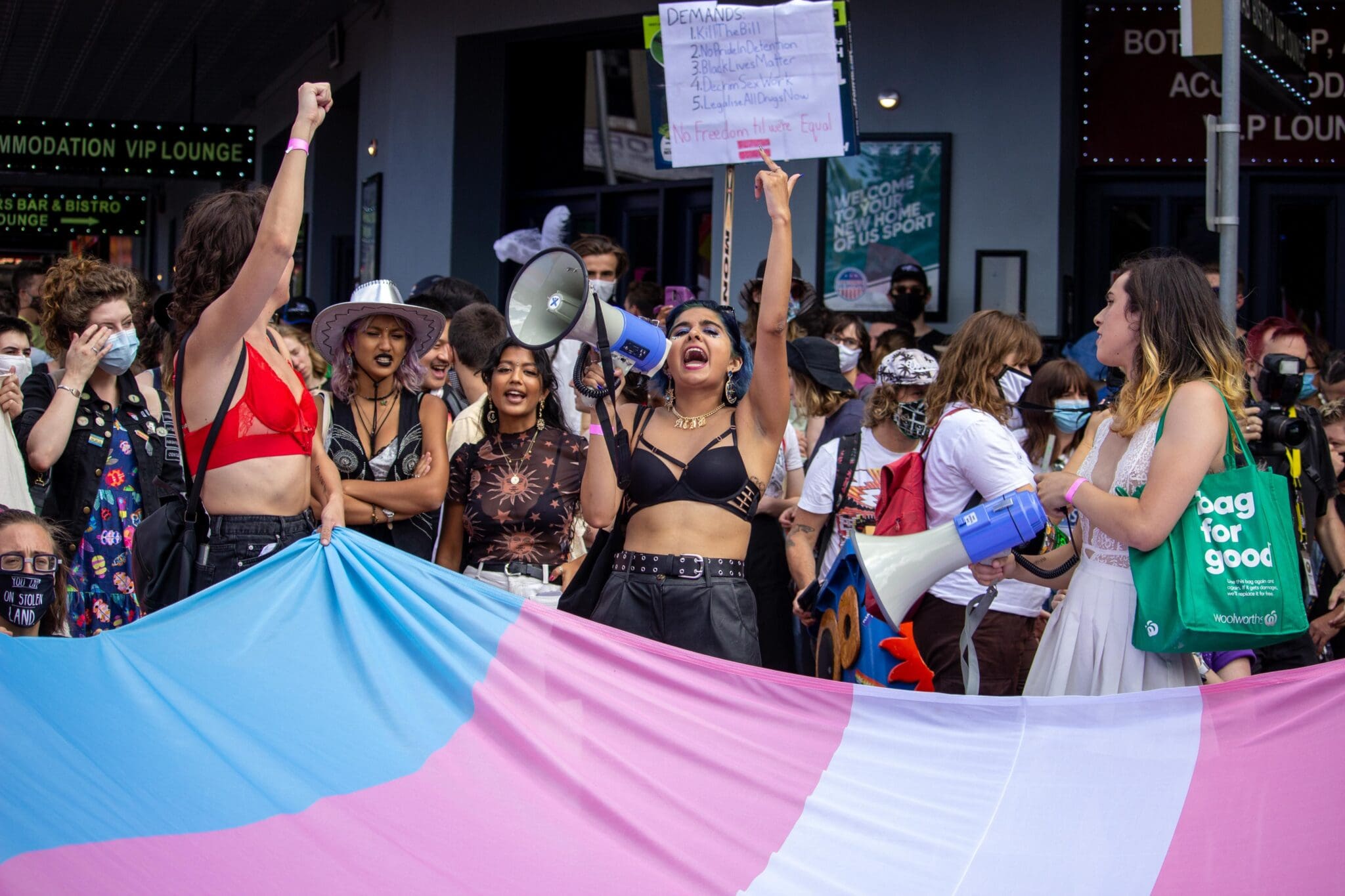
At the Trans Day of Visibility rally on 27 March, which PiP co-organised with a network of other community organisations, longtime PiP supporter and Greens MP Jenny Leong condemned trans-exclusionary radical feminists (TERFs), defiantly building a moat around the fortress PiP have built. “You [TERFs] are not our friends”, she screeched into the mic to raucous applause. “You are as much a problem as the patriarchy is a problem.”
To bookend the period of stagnation in local, queer, radical politics, it’s possible to flick back through the archival albums further than Charlie suggests. As historian Robert Reynolds demonstrates in his essay ‘Endangered territory, endangered identity’, opinion pieces lamenting the loss of Oxford Street as a queer space peppered the pages of the gay street press in Sydney in the 2000s. One particularly polemical think piece from 2007, published in SX News, suggested that hedonism and selfishness had replaced earlier activism and solidarity and that the queer community was complicit in Oxford Street’s demise. The writer, a resident atop Taylor Square, traced Oxford Street’s devolution into a space filled with “over-medicated males from the suburbs staking their territory… Kath and Kim clones and the sirens and yelling… [of] yet another crystal-fuelled fight or G overdose.”
Accurate or not, that anxiety touches on something PiP are very critical of – the queer community selling its soul to big business (‘rainbow capitalism’). This is evident both in the excessive corporate sponsorship of Mardi Gras and gentrification on Oxford Street.
What we are witnessing is a turning point in queer activism. From the perspective of Mardi Gras’ right-wing caucus, it is a terrifying cultural shift of seismic proportions. PiP, constantly emphasising the intersectionality of oppression, appears to be a staunch, younger, more racially and culturally-diverse generation fighting against an established generation of queers. Through their podcasts and rallies, PiP have platformed new voices, usually sidelined. Formerly incarcerated, gay, Aboriginal man Keith Quayle is just one example.
In the eyes of PiP – to generalise for a moment – the right-wing Mardi Gras caucus grow fat in the ivory towers of a post-gay utopia. What PiP members see is an older generation who have priced out younger queers from Sydney’s disappearing, inner-city, queer enclaves, assimilated into Australia’s middle class cosmopolitanism and given up the struggle. They have fooled themselves into believing that their sexual orientation and gender identities are almost, now, no longer important and no longer targeted. Academics including Alan Sinfield and Henning Bech have theorised that a gay identity, perhaps even a lesbian one, may be historical phenomena.
PiP expose the frailties and privileges in such a worldview. Part of the current fracture in Sydney’s queer community stems from PiP’s recognition that the community is not comfortable and safe. This sanitised vision excludes more marginalised subsects of the queer community including trans women of colour and trans sex workers who are disproportionately subject to abuse.
PiP’s persistent campaign against trans violence could not be more timely. National watchdogs and reports suggest that trans violence has increased in neoliberal democracies in recent years. Since the Human Rights Campaign, the largest queer advocacy organisation in the US, began logging data on violence against gender non-conforming Americans in 2013, the organisation has reportedly never recorded a year with higher fatal violence than 2020. While data on violence against trans bodies is notoriously difficult to collate, due to underreporting, crime data being recorded in gender binaries and a failure of bureaucracy, data obtained by the Victorian Pride Lobby has revealed that anti-queer hate crimes spiked in 2020. One survey published in June last year suggests that trans women of colour in Australia are particularly vulnerable to abuse. They are more likely than other women to report having been assaulted by a stranger. They are also twice as likely as other women to be sexually assaulted 10 or more times.
Only a couple of weeks ago, Australia’s trans community was rocked when news broke that a man convicted of manslaughter – for choking and killing Mhelody Bruno, a Filipino transwoman, during sex – had avoided prison due to a sentencing error. Many believed that this was not an honest error but a result of systemic oppression and a criminal justice system that is biased and brutal towards non-gender conforming people. (The man, a former RAAF corporal, was re-sentenced on 29 March to 22 months in prison.)
Pride in Protest collaborated with Anakbayan Sydney and Migrante New South Wales to organise a protest and vigil in late March to demand justice for Mhelody Bruno. PiP issued a statement in which they located the death “at the intersection of transphobia, sexism, and racism” and within the context of “Australia’s ongoing imperialism in the Pacific”.
Similarly, PiP campaign against police presence at Mardi Gras because they recognise that police actively contribute to discrimination and violence against queer communities. As Charlie points out to me, police rarely prevent hate crimes at the time that they occur. This year there were a number of homophobic incidences during Mardi Gras. ABC journalist Mark Reddie, for example, was walking home from a Mardi Gras afterparty near Oxford Street with a group of gay men when occupants of a car, cackling, threw eggs at them. When he tweeted and wrote a perspective piece about the incident, a number of people came forward with similar stories of egging and having bottles thrown at them that night.
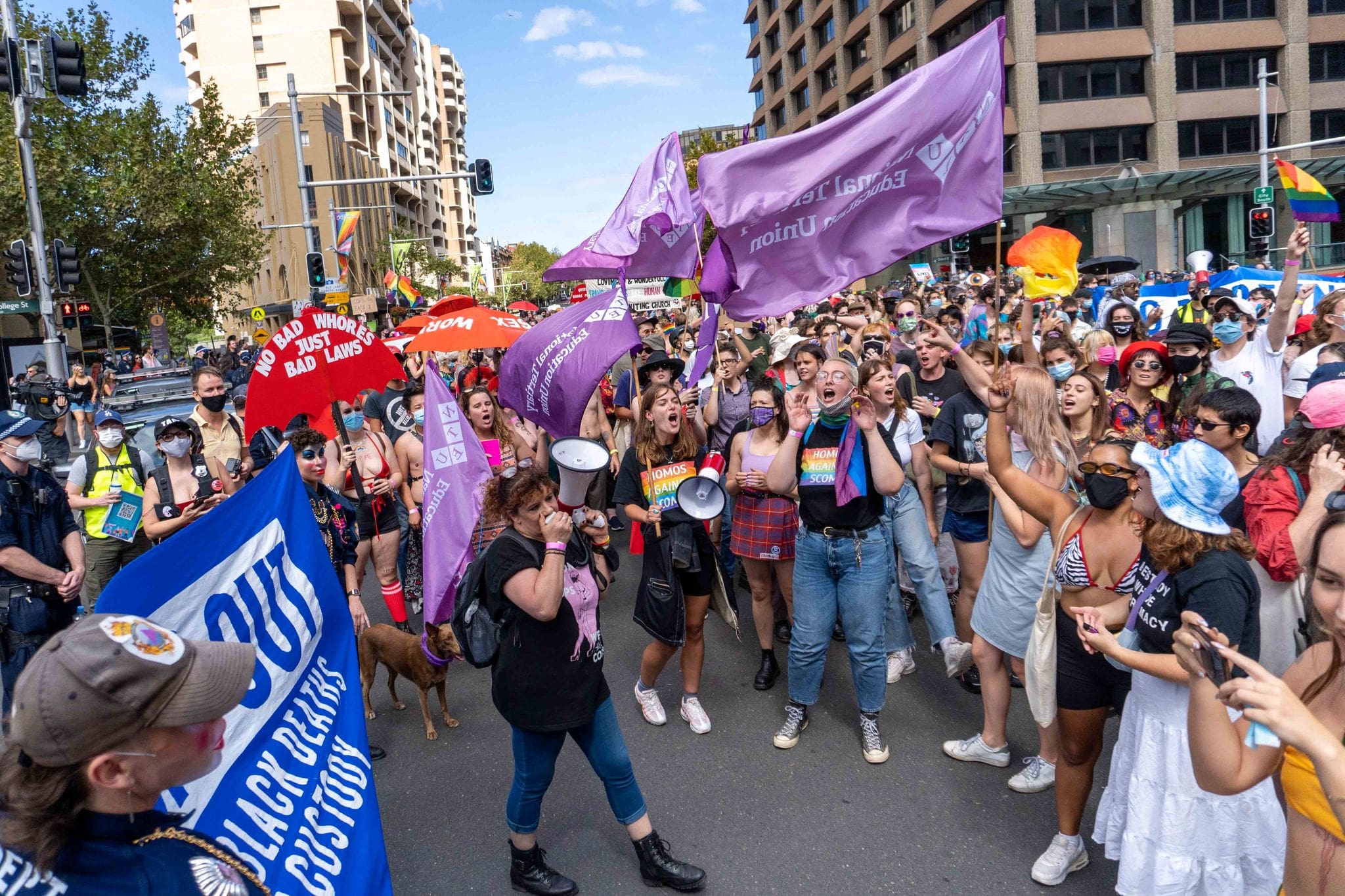
* * *
It’s a few days before Mardi Gras and I am sitting in a circle with an affinity group. A friend is furiously scribbling in a note pad. She interjects sometimes to clarify decisions, words shooting from her mouth like machine-gun fire. I keep leaning down to itch my leg.
Albeit disconnected from the main organisers, we are creating lists of supplies to bring to the Mardi Gras march in case of police violence and brainstorming ideas about how to combat fash or alt-right media, should they turn up. An air of underlying trepidation pervades the whole meeting.
It’s been a tough year for activists. Police have been all over us. The navy blue uniforms of the Public Order and Riot Squad have been a perennial eyesore at even the smallest protests. The clip-clop of the Mounted Unit and the barking of the Dog Squad have become white noise. Under the guise of public health, Australian authorities have implemented techno-totalitarian state surveillance.
One trans rights rally, organised by Community Action for Rainbow Rights (CARR), coincided with the peak of police brutality during lockdown. Police descended violently upon the crowd that day and broke the wrist of a trans PiP organiser; memories of which don’t die easily.
At PiP’s Mardi Gras rally on Oxford Street this year, there were no arrests and no fines issued. This is not to say that the police behaved themselves entirely. There were two drug searches – nothing was found – and one police officer wore a thin blue line patch. But Charlie describes the police response as “unprecedented”.
The reason? “The community pressure was there”. PiP received endorsements from various politicians – Labor, Greens and an independent – non-government organisations and 78ers. Aided by media attention, momentum was building like water boiling over in a pot.
But the legality of the march was far from guaranteed. NSW Police had moved to block the march from going ahead, taking the organisers to the NSW Supreme Court. As Mikhael explains, PiP were unwilling to compromise on their position. “We have a policy of not really negotiating when we can avoid it.”
Two days before the rally, after receiving advice from Greens MP Jenny Leong, the organisers applied directly to the Minister for Health Brad Hazzard for a health exemption. Keen to avoid an overflow of scalding hot water and burns injuries to queers and their allies – they were undoubtedly going to turn up regardless of the event’s legality – the health department granted PiP a health exemption mere hours before their court hearing was due to begin.
Charlie suggests that “the [NSW] health department wanted this to happen to prevent an explosive situation.” When she discusses the value of the march, her voice crescendos and her words develop a sharper, steely edge. With a staccato rhythm, she proclaims: “what we showed in this rally was, actually, if you fight back and you push back… not only can you win arguments about reducing police presence at Mardi Gras, but, if you do so, you actually make your community more safe.”
This ripple effect, this armour, protects an entity far greater than just the queer community. In a post-COVID world, Charlie says that PiP “have a responsibility not just to our community but every community that needs the right to protest.”
“If we make concessions on the right to protest here, it’s going to have an effect on every rally that comes after us.”
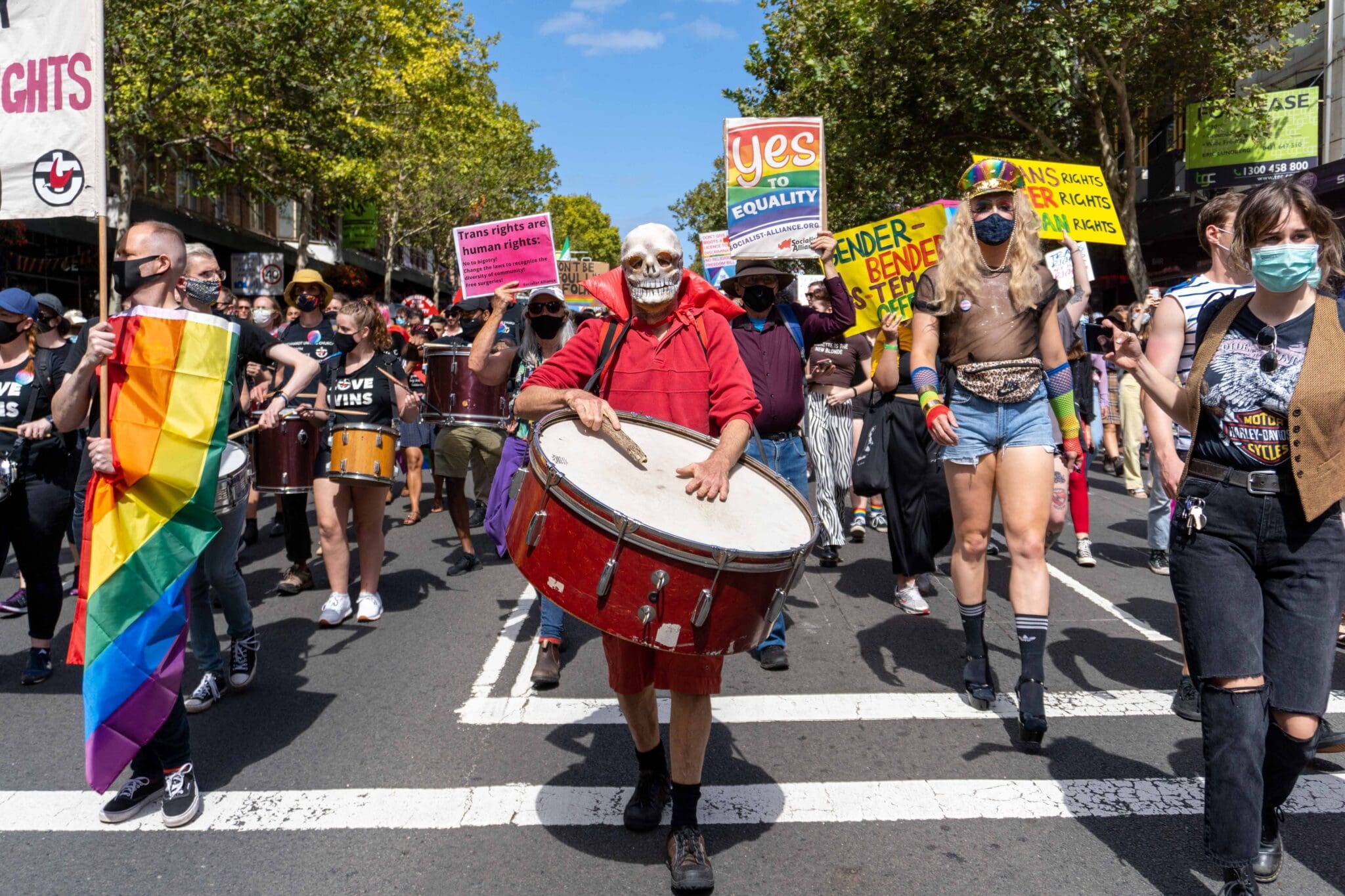
* * *
One criticism that has cropped up in conversations I’ve had with left activists about PiP is that PiP focuses too heavily on lobbying the Mardi Gras Board and the parade’s symbolic politics rather than more “practical” or “useful” queer activism. While this may have once been true – PiP began as a single Mardi Gras float advocating for refugee rights and the cessation of mandatory detention – recent events suggests the opposite to be true. PiP’s focus and ambition extend well beyond Mardi Gras.
As PiP evolves, it is becoming, Charlie suggests, “a broad mass movement inside the community” centred on concrete demands, such as the nationwide decriminalisation of sex work, prison abolition and stopping Mark Latham’s anti-trans “Parental Rights” bill. Already, PiP has gone some way towards solidifying a pink-black alliance.
By contesting the leadership of the queer community and striking at its symbolic heart – Mardi Gras – Pip are poking eggshell fantasies and it has made them a few enemies. Mikhael issues a word of warning on the phone to me: “They [Mardi Gras’ right-wing caucus] don’t want us there because we threaten their hegemony. We threaten their control of the narrative and their corporate sponsors… I hope that we keep scaring them.”
Threatened they certainly are. After the Mardi Gras protest, PiP’s social media accounts attracted a mob of trolls and online vitriol. In late March, Pride in Protest publicly shared screenshots from the reactionary ‘Pride in Progress’ Facebook group, in which two self-identifying Mardi Gras Arts Ltd employees wrote that it is their duty to fight and “start rallying members against Pride in Protest.”
PiP aren’t interested so much in reshaping systems and institutions as they are in rebuilding them from the ground up. Perhaps there will be some collateral damage amid the dust storm that results from their demolition work. But it’s the possibility of something better – a persistent optimism, not cynicism as many believe – that drives the organisation forward. To Mardi Gras’ right-wing caucus, the vacuum of the unknown and the desolate cold of reality are still too daunting to consider.
Perhaps Mikhael sums it up best.
“We won’t achieve our pure liberation under a system where we have to ask for liberation. We achieve our pure liberation when we take it.”




